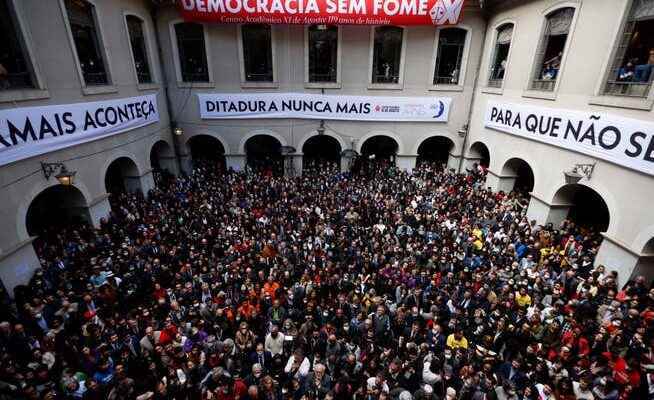The largest demonstration for the rule of law and democracy in São Paulo to date brought together a broad alliance. But the economy is crucial to President Bolsonaro’s chances of re-election. Things are looking surprisingly good for the right-wing populist.
Hundreds of Brazilians gathered at the law school of the University of São Paulo.
In 1977, at the height of the military dictatorship in Brazil, the rector read a public letter to Brazilians on behalf of the São Paulo law school. In it, the legal scholars demanded the end of the dictatorship – and in doing so actually initiated the difficult retreat of the military into the barracks. In 1985, the uniformed resigned from the controls of power.
Two events followed on from this historic event on Thursday. A broad civilian coalition read out two letters in defense of the rule of law and democracy in Brazil at the same place as exactly 45 years ago. Without mentioning President Jair Bolsonaro by name, the organizers managed for the first time since the end of the pandemic to stage a public protest against the right-wing populist government in Brasilia. The reason is Bolsonaro’s constant crossing of borders and hostility towards democracy and the judiciary.
Trade unionists next to business bosses and bankers
Despite the thousands of people, the act was peaceful. It was astonishing that the action brought together groups that would otherwise never appear together: Union leaders as well as prominent bankers and business representatives gathered for the letter written by the São Paulo Industry Association (Fiesp), which was responsible for the economy. In the letter from the law faculty, representatives of the landless movement and women artists had their say, as did Afro-Brazilian spokesmen. A million people have already signed this letter.
The trigger for the publication of the manifestos were the allegations repeatedly made by President Bolsonaro regarding alleged weaknesses in the electronic voting system. His attacks on the judiciary are also increasing in intensity. He accuses the Supreme Court of conspiring against his election victory.
There are general elections in Brazil in early September. With Bolsonaro trailing far behind former President Luiz Inácio Lula da Silva in nationwide polls of voting intentions until recently, many fear he may try to use his attacks to postpone the elections or disregard the election result.
Bolsonaro’s popularity is rising as the economy recovers
But despite the euphoria of the organizers, who described the event as historic, the impact on the elections is likely to be limited. Because it was above all the intellectual and entrepreneurial elite of Brazil that gathered. Only a minority of them will vote for Bolsonaro anyway. Its popularity is likely to depend much more on the economic situation.
And things are looking surprisingly good for Bolsonaro at the moment: earlier this week, the government launched the “Auxílio Brasil” social assistance program, under which 30 million poor Brazilians will now receive payments of half the minimum wage. Taxi drivers and truckers receive subsidies directly into their accounts. Poor families receive a subsidy when buying cooking gas. In addition, the government is lowering fuel prices through tax exemptions and decrees.
Unemployment has fallen below ten percent. Growth is picking up and could increase to 2 percent this year. Inflation is also falling faster than expected until recently. It should be eight percent by the end of the year.
These improved prospects are already having a positive effect on Bolsonaro’s popularity: According to a survey by the Quaest Institute in the state of São Paulo – with the largest electorate in the country – Bolsonaro and Lula have almost drawn the same voting intentions. Lula only leads by two percentage points for the first round of voting.
